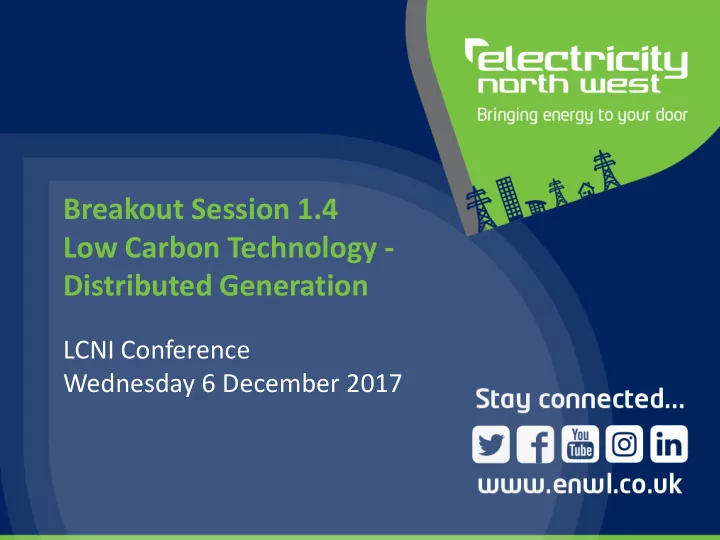

Breakout Session 1.4 Low Carbon Technology - Distributed Generation LCNI Conference Wednesday 6 December 2017 1
Ben Ingham Innovation Engineer 2
Problem - LCTs create network issues Drift range LCTs rapidly surpass voltage and thermal network capacity 3
Network reliability improvement Spectrum C C 2 C TC C W C 2 C CLASS L W W C L C 2 C C Capacity to Customers Capacitor WEEZAP LYNX On-load tap changer C 2 C C W L TC Builds on C 2 C and CLASS Storage compatible Transferable solutions 4
Conservation voltage reduction New devices allow safe meshed operation Integrated capacitors and OLTCs allow dynamic voltage control Enables networks and appliances to work in harmony across load range C W L W Low cost Quick fit Minimal disruption Low carbon Low loss Invisible to customers Faster connection of low carbon technologies 5
The Smart Street system 50 end-point 3 overhead 498 Weezaps monitoring devices 43 Lynx line HV capacitors Spectrum 5 (NMS) 5 on-load tap changing 84 LV capacitors 3 HV capacitors transformers 6
Trials – test regimes Smart Street trial Test regime 1. On-load tap changing distribution transformer only 2. On-load tap changing distribution transformer and capacitor(s) on LV circuits LV voltage control 3. Capacitors at distribution substation only 4. Capacitors at distribution substation and on LV circuits 5. Capacitor(s) on LV circuits only 1. LV radial circuits LV network management & interconnection 2. LV interconnected circuits 1. Voltage controllers at primary substation only HV voltage control 2. Voltage controllers at primary substation and capacitor(s) on HV circuits 1. HV radial circuits HV network management & interconnection 2. HV interconnected circuits 1. Losses reduction Network configuration & voltage optimisation 2. Energy consumption reduction 7
Aims Quantification Validation of Identify potential of benefits optimisation power quality techniques and customer side impacts 8
Trials Some hunting issues with Operation of meshing and Volt-VAr compensation capacitors proven operations 9
Customer engagement IET led-consultation on Workshop held in London the impact on customer on the 30 November 2017 installations 10
Voltage impacts – LV Voltage at distribution substation 1 pu = 230v 11
Fault level impacts Fault levels at Denton East 12
Outcomes Real data Trade off Final analysis Carbon used to between of collected benefit validate losses and data due assessment modelled energy February and business networks savings 2018 case to be quantified completed by January 2018 13
Losses vs energy savings 14
Smart Street summary First example of centrally Combine into one controlled LV network end-to-end system Range of intervention Optimisation solutions Challenge Learning Faster LCT adoption Carbon Benefits Lower energy bills Less embedded Footprint carbon More reliable supply Re-usable technology Reinforcement savings Optimise energy and losses 15
For more information www.enwl.co.uk/innovation e innovation@enwl.co.uk 0800 195 4141 @ElecNW_News linkedin.com/company/electricity-north-west facebook.com/ElectricityNorthWest youtube.com/ElectricityNorthWest Please contact us if you have any questions or would like to arrange a one-to-one briefing about our innovation projects 16
Recommend
More recommend